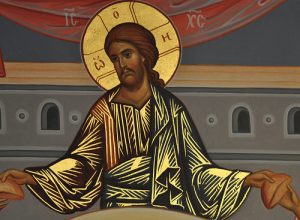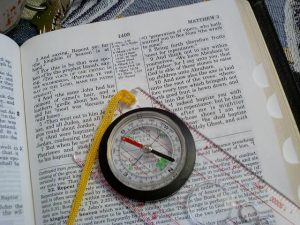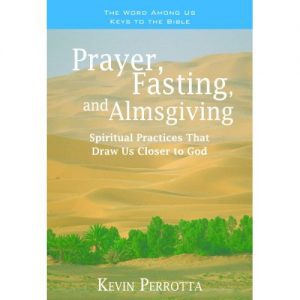Food for the Journey

We need food for the journey. We need Spiritual nourishment for our souls as we journey through life, just as our bodies need physical food. What is this Spiritual nourishment? The Holy Spirit cooperates with Jesus to feed us and nourish our souls. We petition God the Father in the Lord’s Prayer to “give us this day our daily bread.” Jesus says, “the human person does not live by bread alone, but by every word that comes from the mouth of God.” (Matthew 4:4)
The Catechism teaches:
“Because the Holy Spirit is the anointing of Christ, it is Christ who…pours out the Spirit among his members to nourish, heal, and organize them in their mutual functions, to give them life, send them to bear witness, and associate them to his self- offering to the Father and to his intercession for the whole world. (#739)
[fruitful_tabs type=”default” width=”100%” fit=”false”]
[fruitful_tab title=”The Eucharist”]
The Eucharist: Word and Sacrament

The Church speaks of two tables, i.e. two sources of spiritual nourishment in the Mass: “the table of the Word” and “the table of the Eucharist.” Also the Catechism says: “With a mother’s foresight, [the Church] also lavishes on us day after day in her liturgy the nourishment of the Word and Eucharist of the Lord.” (#2040)
We already considered how the Scriptures and the Eucharist give us direction on the Catholic Spiritual Journey; they also provide nourishment for the Spiritual life. Proclaimed in the Mass, the Scriptures give us inspiration to know Christ and to live his life, especially in his dying and rising (the Paschal Mystery).
The Sacrament we receive in the Eucharist is the risen Christ. St. Augustine, in his Confessions, wrote about Christ: “I seemed to hear your voice from on high [saying:]: ‘I am the food of the mature: grow, then, and you shall eat me. You will not change me into yourself like bodily food; but you will be changed into me.'” (Confessions, VII, 10, 18)
The Catechism says:
“What material food produces in our bodily life, Holy Communion wonderfully achieves in our spiritual life. Communion with the flesh of the risen Christ, a flesh ‘given life and giving life through the Holy Spirit,’ preserves, increases, and renews the life of grace received at Baptism. This growth in Christian life needs the nourishment of Eucharistic Communion, the bread for our pilgrimage until the moment of death, when it will be given to us as viaticum. [last Communion]” (#1392)
In Holy Communion in the Eucharist we receive the Risen Body of Christ and the power of the Holy Spirit, along with the Church’s companionship (the word literally means “those who share bread”) to strengthen us for our journey by an intimate contact with God.
[/fruitful_tab]
[fruitful_tab title=”Reading and Meditation”]
Devotional Scripture Reading and Meditation
The inspiration and nourishment of the Scriptures are not restricted to the Eucharistic celebration (the Mass). We should not just hear the Scriptures once a week at the Sunday Mass. The Mass instructs us in what we should do every day. We hear the Scriptures on the First Day of the week, Sunday, to remember to hear them (i.e. read them) every day of the week.

The Scripture Readings of the daily Mass may be found along with a daily reflection upon the Readings at the U.S. Bishops’ website: click here.
There are resources to help us in reading the Scripture and meditating upon them. A careful, slow reading of the Scriptures is often referred to by the Latin term lectio divina, or simply lectio (pronounced lex-ee-oh). It is a reading that strains to hear God speaking to us personally in the Scriptures: “The lectio divina, [is] where the Word of God is so read and meditated [upon] that it becomes prayer…” (Catechism#1177)
We must “chew” on the Scriptures, and digest their meaning for us: “When I found your words, O Lord, I devoured them; they became the joy and the delight of my heart…” (See Jeremiah 15:16a)
“Meditation is above all a quest. The mind seeks to understand the why and how of the Christian life, in order to adhere and respond to what the Lord is asking. The required attentiveness is difficult to sustain. We are usually helped by books, and Christians do not want for them: the Sacred Scriptures, particularly the Gospels…liturgical texts of the day or season, writings of the spiritual fathers, works of spirituality…” (Catechism #2705)
Many find that as a supplement to devotional reading of Scripture, other books of spirituality can help nourish the Catholic Spiritual Journey.
[/fruitful_tab]
[fruitful_tab title=”Prayer, Fasting, Almsgiving”]
Prayer and Fasting and Almsgiving
Prayer
Just as the Sunday Eucharist models for us the necessity of hearing the Word of God all during the week, so it also models the necessity of prayer all during the week. We start our week on Sunday with the Church gathered in prayer; we are sent out into the world and our week to “pray without ceasing.” (1 Thessalonians 5:17).
The Church’s liturgy (public prayer and worship) also models for us several ways Christians pray: Prayer of Petition; Prayer of Intercession; Prayer of Praise and Thanksgiving; Prayer of Blessing and Adoration. There is also the distinction between formal, vocal prayer and contemplation.
 Fasting
Fasting
It may seem paradoxical to include fasting under the heading of spiritual nourishment. However, fasting deepens our hunger for God and prayer. Fasting is not only from physical food, but also from anything we may use in excess. There is a certain maxim that over-consumption starves our souls. Fasting counters our almost obsessive drive to consume. We need to rediscover the practice of fasting for many reasons but also because Jesus told us to fast. (See Matthew 6:16-18)
The Church also connects fasting to the Eucharist: we are to fast one hour before receiving Communion in the Mass.
Almsgiving
Our prayer and fasting should always be connected with almsgiving, literally meaning the giving (sharing) of mercy or compassion. We give in the ways Jesus describes in the Gospel. The Church sums up these in the corporal acts of mercy:
“The works of mercy are charitable actions by which we come to the aid of our neighbor in his spiritual and bodily necessities. Instructing, advising, consoling, comforting are spiritual works of mercy, as are forgiving and bearing wrongs patiently. The corporal works of mercy consist especially in feeding the hungry, sheltering the homeless, clothing the naked, visiting the sick and imprisoned, and burying the dead. Among all these, giving alms to the poor is one of the chief witnesses to fraternal charity: it is also a work of justice pleasing to God…” (Catechism#2447; emphasis added)
If the journey with Christ is one of sacrificial, compassionate love, then it is easy to see that practicing almsgiving in its many forms nourishes and makes grow this compassionate love within us.
If our prayer and fasting lead only to self-absorption (“navel-gazing”) it is not yet Christian. That is why almsgiving especially turns our gaze “outward,” to consider the needs of others. The nourishment of our soul in Christ should change us into compassionate persons like Christ.
[/fruitful_tab]
[fruitful_tab title=”Physical/Spiritual “]
Creation, Beauty, Imagination, Art and Music
God created the world and it is creation that literally nourishes life within us. This is true at the physical level; it is also true at the spiritual level. Many report that they feel closer to God (“more spiritual”) when they are in Nature, captivated by some beautiful part of creation: a sunset, the vast ocean, a mountaintop, the starry skies at night away from city lights.
Beauty, both in creation and in the fine arts, lifts up our hearts, because beauty is one of the attributes of God, the Creator and the Great Artist. St. Augustine described God as Beauty in his Confessions when he wrote: “Late have I loved you, O Beauty Ever Ancient, Ever New.” (X, 27, 38)
Pope Benedict XVI reminded artists “to arouse wonder at and desire for beauty, to form people’s sensitivity and to nourish a passion for everything that is a genuine expression of human genius and a reflection of divine beauty.” (Message of 11/27/2008; emphasis added)
This appreciation for creation and beauty is very much part of the Catholic imagination, which is a sacramental imagination (creation and human culture can reveal God to us, supremely so in the humanity of Christ Jesus). In this regard we are nourished also by creative imagination in literature, art, music, film. The Catholic Spiritual Journey can be nourished by these human creative expressions when they are also truly beautiful, good and true.
“Art, in all its forms, at the point where it encounters the great questions of our existence, the fundamental themes that give life its meaning, can take on a religious quality, thereby turning into a path of profound inner reflection and spirituality.” (Pope Benedict XVI’s Address to Artists, “You Are the Custodians of Beauty,” 11/22/2009)

[/fruitful_tab]
[fruitful_tab title=”Doing God’s Will”]
Doing God’s Will
“Jesus says My food is to do the will of [God] who sent me, and to accomplish his work.” (John 4:34)
In this statement we see that doing God’s will also nourishes our soul, as it did the soul of Christ. Recall that St. Augustine wrote: “Our hearts were made for You, O God, and they are restless until they find their rest in You.” We can paraphrase Augustine and also say: Our hearts were made to do Your will, O God, and they are restless, until they do Your will.”
God who is All-Good would not will anything for us that is not for our good. “For I know well the plans I have in mind for you, says the LORD, plans for your welfare, not for woe! plans to give you a future full of hope.” (Jeremiah 29:11)
Christ reveals the will of God to us which is the Kingdom of God. He teaches us to pray: “Our Father… Thy Kingdom come, Thy will be done, on earth as it is in heaven. Give us today our daily bread.” Again, the Kingdom of God is the rule of the God who is love. God’s love rules heaven and turns it into a Paradise of love; so he wills his love to rule in our world and in our lives.
On our Catholic Spiritual Journey, we will want to do the will of God with the strength God provides us through the Holy Spirit. Just as the Virgin Mary cooperated with the Holy Spirit in her life to do God’s will (see Luke 1:34-38), so we can cooperate with the Spirit in our lives, who nourishes our spirits, makes present the mystery of Christ within us, and helps us to do God’s will.
[/fruitful_tab]
[/fruitful_tabs]
